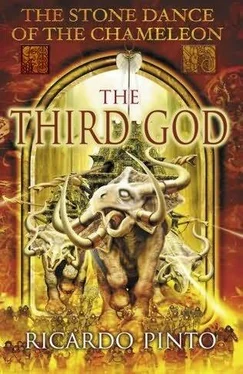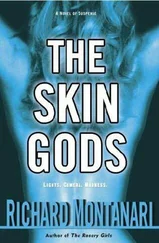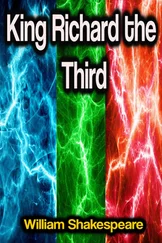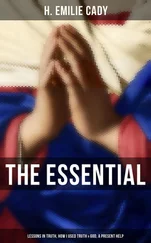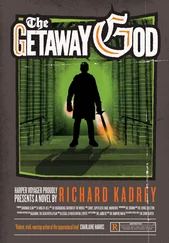Ricardo Pinto - The Third God
Здесь есть возможность читать онлайн «Ricardo Pinto - The Third God» весь текст электронной книги совершенно бесплатно (целиком полную версию без сокращений). В некоторых случаях можно слушать аудио, скачать через торрент в формате fb2 и присутствует краткое содержание. Жанр: Фэнтези, на английском языке. Описание произведения, (предисловие) а так же отзывы посетителей доступны на портале библиотеки ЛибКат.
- Название:The Third God
- Автор:
- Жанр:
- Год:неизвестен
- ISBN:нет данных
- Рейтинг книги:3 / 5. Голосов: 1
-
Избранное:Добавить в избранное
- Отзывы:
-
Ваша оценка:
- 60
- 1
- 2
- 3
- 4
- 5
The Third God: краткое содержание, описание и аннотация
Предлагаем к чтению аннотацию, описание, краткое содержание или предисловие (зависит от того, что написал сам автор книги «The Third God»). Если вы не нашли необходимую информацию о книге — напишите в комментариях, мы постараемся отыскать её.
The Third God — читать онлайн бесплатно полную книгу (весь текст) целиком
Ниже представлен текст книги, разбитый по страницам. Система сохранения места последней прочитанной страницы, позволяет с удобством читать онлайн бесплатно книгу «The Third God», без необходимости каждый раз заново искать на чём Вы остановились. Поставьте закладку, и сможете в любой момент перейти на страницу, на которой закончили чтение.
Интервал:
Закладка:
Just then the boat carried him out of the tunnel and he forgot everything else, mesmerized. Before them the Cloaca flowed on, seeming to rise until, in the near distance, it overflowed to fill the Canyon with a lake that shimmered all the way to where the Wheel colossi stood gazing out upon a world of blinding, dazzling light.
When the boat reached a point in the Cloaca where its walls were level with the bows, they began helping the children to disembark onto a portion of the dry Canyon floor still above the flood. Fern’s boat arrived before they were finished. Carnelian confirmed with him the details of the plan they had agreed earlier. Leaving him to muster the flotilla as it appeared from under the Green Gate, Carnelian set off down the Cloaca, his boat lighter and swifter.
Reaching open water, the boat leapt forward as if in delight at winning her freedom from the Cloaca. Carnelian too felt elation as they sped down the flooded Canyon. They slowed as they passed the ankles of the colossi. Kharon came forward to stare in wonder at a world they knew only from stories. Before them the drowned Wheel seemed shimmering glass. Carnelian could just make out the ring of punishment poles standing at its centre; the backs of the six bridges rising like huimur from the water. He gazed round the outermost edge of the lake. The five pairs of gatehouses still seemed intact, but the rim of tenements and towers that had once made the Wheel a shallow bowl seemed rotten, crumbled, broken. Beyond he thought he could make out something that might have been the ruins of the city; further still, nothing but an ominous haze that could have been the very edge of existence.
They rowed towards the Wheel, staying above the Cloaca channel in case the water covering the Canyon floor was too shallow. When they reached the moat that defined the edge of the Wheel, they decided to follow it sunwise, reluctant to move out over the submerged pavement for fear of running aground. One of the bridges that linked the Canyon to the Wheel they drifted over without mishap. Carnelian gazed at the lake, sad at how still the place was that once had been such a ferment of humanity. Soon they were approaching the southern lip of the Canyon where twin gatehouses rose from the water embossed with quincunxes. As they passed over the bridge these towers guarded, there rose on their right the vast, once dazzling brass gates, tarnished, as if sucking the blue-green up from the water. On their left the beginning of the Great East Road had become a stagnant canal clotted with mounds and debris; flanked by mouldering half-collapsed tenements like a long jawful of rotting teeth. The kharon stared, their wonder turning to horror. Carnelian shared their relief when this view was hidden by the rim wall. This too was decaying. The buildings that had once formed its smooth jigsaw were coming apart. Ramparts buttressed with brick, though bulging, still stood; but in many places reinforcing beams, charred, shattered or swollen, had torn wounds in the mudbrick walls. Leprous plaques of shattered plaster covered the facades that looked ready to shed them dangerously onto the boat slipping past below. Sewer mouths had ruptured, dribbling filth to corrode cavities into the cliff. The whole curving wall seemed a dance of giants, rotting as they staggered and threatening to collapse. The further the boat went the more nervous everyone became of the ruinous overhangs. Some looked so precarious that the waves their oars sent lapping at the foundations might bring the whole lot down on them.
At last they steered away, between a pair of crooked cranes, out over the pavement of the Wheel, eyes half closed, anticipating a grinding of the keel even as they tried to spy out a clear channel. Carnelian became aware that they were following the dark serpent of the Dragonway, sinuous beneath the water, but at that moment the steersman turned their prow back towards the rim. They were moving round the back of the second pair of gatehouses to avoid the brass posts where once guards had demanded tolls. Soon these were swept from view by the bulk of the Gate of the Sun. They slowed behind it, floating above its bridge, as they turned towards the Great South Road: another gloomy canal hemmed in by ruined, leaning walls. Its path of water in some places seemed merely a linked string of wounds gouged through the corpse of the city.
Carnelian’s heart sank into his stomach. How could they find a way through that? As he looked round, past the gatehouses, the Wheel seemed seductively open and free. Perhaps the next road would provide a clearer route to the Gatemarsh; but shadows were lengthening. If he did not find a way now, they would have to try again the next day. Could the children spend a whole night crammed on the boats? Perhaps they could all disembark in the Canyon. He imagined how long it would take; the chaos. His plan had been to disembark them on the road south before nightfall. That was still the best plan. Reluctantly, he gave the steersman the command to take them into the rotting city.
They poled the boat from one pool to the next, having to coax her keel through the narrow channels that linked them. The flooded road was shoaled by the mudbrick walls that had collapsed into it, then softened into shapeless mounds. In places they had to lower themselves over her bows and struggle to find a footing in the slime as they pushed and dragged her hull through the sucking mud.
Once, Carnelian wandered away into what had once been a courtyard. The place stank of mildew and sodden plaster. The walls defining the chambers that opened into the court were now vague, crumbling boundaries. Here and there a patch of stucco still showed a snatch of ochre, of blue, of yellow that spoke of a room in which people had lived. Mostly everything was blotchy with mould or succumbing to a creeping dingy green scum. The angled, swollen, charred stumps of immense beams seemed bones ruptured for their marrow. Peering round at the blackened shells, he saw how conflagration had brought floors and walls down. The tumbled ruins seemed the remains of half-burnt, half-eaten corpses.
Slowly they dragged the bone boat along the road. Most of the alleyways branching off on either side were choked with fallen debris. Those that gleamed with water were too narrow for the boat. Carnelian grew morose, feeling the rot of the place invading him. All around them, torn and exposed, were homes where once families had eaten their meals, loved, slept. Where humble treasures had cheered busy lives. What fire had not consumed was sodden and as mouldy as old bread. The spaces seemed haunted by voices and laughter and the roar of the multitude that had once poured down this thoroughfare. The relentless decay drew even these imagined vestiges out of him until nothing was left but ruin and a silence that pressed in on them. For they were clearly the only living things in that dead city. He could not deny the growing, uneasy realization that they had not seen the slightest scrap of any of the millions that had once inhabited this termite mound, nor yet of the sartlar hordes. Away from the gory boat, there was not even the slightest odour of a corpse.
Then, just as they came within sight of the burnt stump of a watch-tower, brightness ahead showed where there must be a wide gap in the buildings. As their ragged prow slipped into the light they saw, to the right, a flight of submerged steps that had once led down to the lake. The water above them formed a channel easily wide and deep enough to accommodate the boat. They scrambled back onto her deck and her oars propelled her between collapsed towers out into open water turned to liquid gold by the late afternoon sun. Across the water they saw the gilded tumbled tenements that flanked another of the raised roads running off towards the west. The flood stretched as far as the horizon. If it had not been so still, Carnelian might have imagined they had reached the sea.
Читать дальшеИнтервал:
Закладка:
Похожие книги на «The Third God»
Представляем Вашему вниманию похожие книги на «The Third God» списком для выбора. Мы отобрали схожую по названию и смыслу литературу в надежде предоставить читателям больше вариантов отыскать новые, интересные, ещё непрочитанные произведения.
Обсуждение, отзывы о книге «The Third God» и просто собственные мнения читателей. Оставьте ваши комментарии, напишите, что Вы думаете о произведении, его смысле или главных героях. Укажите что конкретно понравилось, а что нет, и почему Вы так считаете.
